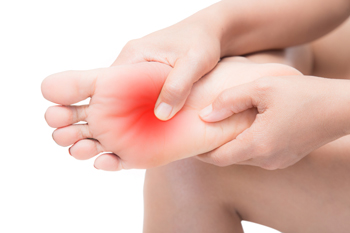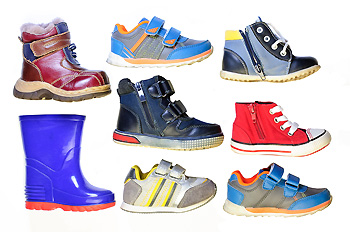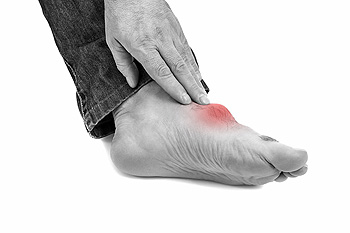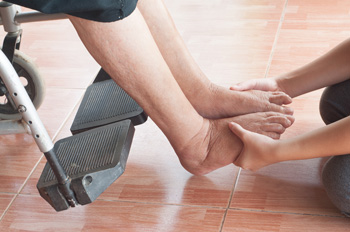Items filtered by date: March 2021
Why Does My Heel Hurt?
 The heel is a fatty cushion on the back of the foot that provides padding. Obesity, improperly fitting shoes, injuries and running and jumping on hard surfaces can all lead to heel pain issues. One of the most common causes of heel pain is plantar fasciitis. Plantar fasciitis occurs when the plantar fascia, the band of tissue along the bottom of the foot that connects the heel to the toes, becomes inflamed. Plantar fasciitis is often associated with a heel spur as well. When the plantar fascia tears near the heel, it can bleed and then calcify. These calcium deposits form heel spurs, which can only be detected through an X-ray. If you are struggling with heel pain, please consult with a podiatrist for a proper diagnosis and treatment.
The heel is a fatty cushion on the back of the foot that provides padding. Obesity, improperly fitting shoes, injuries and running and jumping on hard surfaces can all lead to heel pain issues. One of the most common causes of heel pain is plantar fasciitis. Plantar fasciitis occurs when the plantar fascia, the band of tissue along the bottom of the foot that connects the heel to the toes, becomes inflamed. Plantar fasciitis is often associated with a heel spur as well. When the plantar fascia tears near the heel, it can bleed and then calcify. These calcium deposits form heel spurs, which can only be detected through an X-ray. If you are struggling with heel pain, please consult with a podiatrist for a proper diagnosis and treatment.
Many people suffer from bouts of heel pain. For more information, contact Elliot T. Udell, DPM of New York. Our doctor can provide the care you need to keep you pain-free and on your feet.
Causes of Heel Pain
Heel pain is often associated with plantar fasciitis. The plantar fascia is a band of tissues that extends along the bottom of the foot. A rip or tear in this ligament can cause inflammation of the tissue.
Achilles tendonitis is another cause of heel pain. Inflammation of the Achilles tendon will cause pain from fractures and muscle tearing. Lack of flexibility is also another symptom.
Heel spurs are another cause of pain. When the tissues of the plantar fascia undergo a great deal of stress, it can lead to ligament separation from the heel bone, causing heel spurs.
Why Might Heel Pain Occur?
- Wearing ill-fitting shoes
- Wearing non-supportive shoes
- Weight change
- Excessive running
Treatments
Heel pain should be treated as soon as possible for immediate results. Keeping your feet in a stress-free environment will help. If you suffer from Achilles tendonitis or plantar fasciitis, applying ice will reduce the swelling. Stretching before an exercise like running will help the muscles. Using all these tips will help make heel pain a condition of the past.
If you have any questions please contact our office located in Hicksville, NY . We offer the newest diagnostic and treatment technologies for all your foot and ankle needs.
Heel Pain
Heel pain can be difficult to deal with, especially if you do not know what the underlying cause is. If you ignore your heel pain, the pain can magnify and potentially develop into a chronic condition. Depending on the location of your heel pain, you have developed a specific condition.
One condition is plantar fasciitis. Plantar fasciitis is caused by the inflammation of the plantar fascia, or the band of tissue that connects the heel bone to the base of the toes. The pain from this condition is initially mild but can intensify as more steps are taken when you wake up in the morning. To treat this condition, medication will likely be necessary. Plantar fasciitis is often associated with heel spurs; both require rest and special stretching exercises.
There are various options your podiatrist may suggest for heel pain. Treatment options for heel pain typically include non-steroidal anti-inflammatory drugs (NSAIDS), which may reduce swelling and pain. Other options are physical therapy, athletic taping, and orthotics. In severe cases of heel pain, surgery may be required.
Preventing heel pain is possible. If you are looking to prevent heel pain from developing in the future, be sure to wear shoes that fit you properly and do not have worn down heels or soles. Be sure to warm up properly before participating in strenuous activities or sports that place a lot of a stress on the heels. If you are experiencing any form of heel pain, speak with your podiatrist to determine the underlying cause and receive the treatment you need.
Peripheral Neuropathy 101
 Peripheral neuropathy is caused when the nerves in the extremities such as the hands or feet are damaged. Neuropathy is generally indicated by pain, numbness, tingling, or a pins and needles sensation in the feet. While one of the most common causes of peripheral neuropathy is diabetes, it can also be caused by metabolic disorders, alcohol, trauma, vitamin deficiency, and even genetics. Treatment options for neuropathy are often individualized and focused on the cause of the neuropathy. Therefore, patients who are experiencing the signs of peripheral neuropathy in their feet should visit a podiatrist for a proper diagnosis and treatment method.
Peripheral neuropathy is caused when the nerves in the extremities such as the hands or feet are damaged. Neuropathy is generally indicated by pain, numbness, tingling, or a pins and needles sensation in the feet. While one of the most common causes of peripheral neuropathy is diabetes, it can also be caused by metabolic disorders, alcohol, trauma, vitamin deficiency, and even genetics. Treatment options for neuropathy are often individualized and focused on the cause of the neuropathy. Therefore, patients who are experiencing the signs of peripheral neuropathy in their feet should visit a podiatrist for a proper diagnosis and treatment method.
Neuropathy
Neuropathy can be a potentially serious condition, especially if it is left undiagnosed. If you have any concerns that you may be experiencing nerve loss in your feet, consult with Elliot T. Udell, DPM from New York. Our doctor will assess your condition and provide you with quality foot and ankle treatment for neuropathy.
What Is Neuropathy?
Neuropathy is a condition that leads to damage to the nerves in the body. Peripheral neuropathy, or neuropathy that affects your peripheral nervous system, usually occurs in the feet. Neuropathy can be triggered by a number of different causes. Such causes include diabetes, infections, cancers, disorders, and toxic substances.
Symptoms of Neuropathy Include:
- Numbness
- Sensation loss
- Prickling and tingling sensations
- Throbbing, freezing, burning pains
- Muscle weakness
Those with diabetes are at serious risk due to being unable to feel an ulcer on their feet. Diabetics usually also suffer from poor blood circulation. This can lead to the wound not healing, infections occurring, and the limb may have to be amputated.
Treatment
To treat neuropathy in the foot, podiatrists will first diagnose the cause of the neuropathy. Figuring out the underlying cause of the neuropathy will allow the podiatrist to prescribe the best treatment, whether it be caused by diabetes, toxic substance exposure, infection, etc. If the nerve has not died, then it’s possible that sensation may be able to return to the foot.
Pain medication may be issued for pain. Electrical nerve stimulation can be used to stimulate nerves. If the neuropathy is caused from pressure on the nerves, then surgery may be necessary.
If you have any questions, please feel free to contact our office located in Hicksville, NY . We offer the newest diagnostic and treatment technologies for all your foot care needs.
Neuropathy
Neuropathy is a condition in which the nerves in the body become damaged from a number of different illnesses. Nerves from any part of the body, including the foot, can be damaged. There are several forms of neuropathy including peripheral neuropathy, cranial neuropathy, focal neuropathy, and autonomic neuropathy. Furthermore there is also mononeuropathy and polyneuropathy. Mononeuropathies affect one nerve while polyneuropathies affect several nerves. Causes of neuropathy include physical injury, diseases, cancers, infections, diabetes, toxic substances, and disorders. It is peripheral neuropathy that affects the feet.
The symptoms of neuropathy vary greatly and can be minor such as numbness, sensation loss, prickling, and tingling sensations. More painful symptoms include throbbing, burning, freezing, and sharp pains. The most severe symptoms can be muscle weakness/paralysis, problems with coordination, and falling.
Podiatrists rely upon a full medical history and a neurological examination to diagnose peripheral neuropathy in the foot. More tests that may be used include nerve function tests to test nerve damage, blood tests to detect diabetes or vitamin deficiencies. Imaging tests, such as CT or MRI scans, might be used to look for abnormalities, and finally nerve or skin biopsies could also be taken.
Treatment depends upon the causes of neuropathy. If the neuropathy was caused by vitamin deficiency, diabetes, infection, or toxic substances, addressing those conditions can lead to the nerve healing and sensation returning to the area. However if the nerve has died, then sensation may never come back to the area. Pain medication may be prescribed for less serious symptoms. Topical creams may also be tried to bring back sensation. Electrical nerve stimulation may be used for a period of time to stimulate nerves. Physical therapy can strengthen muscle and improve movement. Finally surgery might be necessary if pressure on the nerve is causing the neuropathy.
If you are experiencing sensation loss, numbness, tingling, or burning sensations in your feet, you may be experiencing neuropathy. Be sure to talk to a podiatrist to be diagnosed right away.
How to Choose Shoes for Your Toddler
 There are plenty of factors to consider when buying shoes for your toddler. These include the shape of the shoes, their fastenings, flexibility, and the materials they are made of. Shoes for a toddler should be the shape of their foot, and flexible enough to provide adequate support and cushioning. They should also be made of soft, breathable materials. The fastenings on the shoes should be adjustable to help get the proper fit. As toddler’s feet grow very quickly, it is important to have their feet measured prior to trying on and buying new shoes. You should avoid buying shoes for the child to “grow into,” as wearing the wrong shoe size can lead to discomfort and injury. For more information about how to find the right shoes for your toddler, please consult with a podiatrist.
There are plenty of factors to consider when buying shoes for your toddler. These include the shape of the shoes, their fastenings, flexibility, and the materials they are made of. Shoes for a toddler should be the shape of their foot, and flexible enough to provide adequate support and cushioning. They should also be made of soft, breathable materials. The fastenings on the shoes should be adjustable to help get the proper fit. As toddler’s feet grow very quickly, it is important to have their feet measured prior to trying on and buying new shoes. You should avoid buying shoes for the child to “grow into,” as wearing the wrong shoe size can lead to discomfort and injury. For more information about how to find the right shoes for your toddler, please consult with a podiatrist.
Making sure that your children maintain good foot health is very important as they grow. If you have any questions, contact Elliot T. Udell, DPM of New York. Our doctor can provide the care you need to keep you pain-free and on your feet.
Keeping Children's Feet Healthy
Having healthy feet during childhood can help prevent medical problems later in life, namely in the back and legs. As children grow, their feet require different types of care. Here are some things to consider...
Although babies do not walk yet, it is still very important to take care of their feet.
Avoid putting tight shoes or socks on his or her feet.
Allow the baby to stretch and kick his or her feet to feel comfortable.
As a toddler, kids are now on the move and begin to develop differently. At this age, toddlers are getting a feel for walking, so don’t be alarmed if your toddler is unsteady or ‘walks funny’.
As your child gets older, it is important to teach them how to take care of their feet.
Show them proper hygiene to prevent infections such as fungus.
Be watchful for any pain or injury.
Have all injuries checked by a doctor as soon as possible.
Comfortable, protective shoes should always be worn, especially at play.
If you have any questions please feel free to contact our office located in Hicksville, NY . We offer the newest diagnostic and treatment technologies for all your foot and ankle needs.
What to Do to Keep Your Child’s Feet Healthy
Being a parent involves caring for your child in every way you can. You make sure they are eating the right food, being nice to others, and staying out of any trouble. However, it is also important that you are watchful of their health, more specifically their foot health. Maintaining good foot health in childhood is important in preventing later conditions in life from happening. As children continue to develop, their feet require different techniques of care. Here are some various ways in which you can help your child’s feet stay healthy.
A baby needs a lot of care and attention overall, but the importance of their feet should never be forgotten. Before a baby turns one, their feet change and develop greatly. It is important that during this time, a mother avoids putting tight socks on their child. She should also encourage movement of their feet so the baby can begin to feel more comfortable using them.
As a baby enters the toddler years of his or her life, they are begin to walk around. When your baby begins to take those first steps, it is crucial that they are wearing protective shoes on their feet. As a mother that is observant of your child’s feet, you may notice changes in them. This is completely normal as the feet are becoming susceptible to the activity of walking. It is normal for a toddler to be a bit unsteady or to “walk funny” at first.
When your child grows out of their toddler years, it is important that you begin to show him or her how to care for their feet on their own. Practice with your child proper hygiene in order to prevent foot fungus or infection. Since children are constantly on the move, it is crucial to be cautious of any accidents or injuries that might occur. If an injury occurs, it is advised that you take your child to be examined by a doctor immediately. Since your child is still growing, particular injuries can shift the way in which a bone or other important part of the foot is developing.
Babies and kids are always changing and growing. Your job as a parent is to make sure they stay healthy and making sure they are properly maintained. This involves proper foot care and making sure the feet stay healthy. Following this guide, your child can live a long and happy life.
How Uric Acid Causes Gout
 Gout occurs when an over-abundance of uric acid in the body creates urate crystals in a joint, causing severe pain, redness, and inflammation. The body produces uric acid as a waste product from breaking down purines—a chemical compound in certain foods and drinks. Obesity, kidney disease, water pills, cancer, and consuming too many sugary drinks, seafood, or red meat can cultivate a profusion of uric acid in the bloodstream. Left untreated, gout may cause permanent joint damage or disfigurement, and surgery may be necessary to remove hard nodules, called tophi, that can form under the skin. Since gout is a type of arthritis that can often form in the big toe or ankle, consult a podiatrist if you exhibit symptoms in order to be properly diagnosed and treated.
Gout occurs when an over-abundance of uric acid in the body creates urate crystals in a joint, causing severe pain, redness, and inflammation. The body produces uric acid as a waste product from breaking down purines—a chemical compound in certain foods and drinks. Obesity, kidney disease, water pills, cancer, and consuming too many sugary drinks, seafood, or red meat can cultivate a profusion of uric acid in the bloodstream. Left untreated, gout may cause permanent joint damage or disfigurement, and surgery may be necessary to remove hard nodules, called tophi, that can form under the skin. Since gout is a type of arthritis that can often form in the big toe or ankle, consult a podiatrist if you exhibit symptoms in order to be properly diagnosed and treated.
Gout is a foot condition that requires certain treatment and care. If you are seeking treatment, contact Elliot T. Udell, DPM from New York. Our doctor will treat your foot and ankle needs.
What Is Gout?
Gout is a type of arthritis caused by a buildup of uric acid in the bloodstream. It often develops in the foot, especially the big toe area, although it can manifest in other parts of the body as well. Gout can make walking and standing very painful and is especially common in diabetics and the obese.
People typically get gout because of a poor diet. Genetic predisposition is also a factor. The children of parents who have had gout frequently have a chance of developing it themselves.
Gout can easily be identified by redness and inflammation of the big toe and the surrounding areas of the foot. Other symptoms include extreme fatigue, joint pain, and running high fevers. Sometimes corticosteroid drugs can be prescribed to treat gout, but the best way to combat this disease is to get more exercise and eat a better diet.
If you have any questions please feel free to contact our office located in Hicksville, NY . We offer the newest diagnostic and treatment technologies for all your foot and ankle needs.
Everything You Need to Know About Gout
Gout, typically found in diabetic patients, is an unusually painful form of arthritis caused by elevated levels of uric acid in the bloodstream. The condition typically strikes the big joint on the big toe. It has also been known to strike the knees, elbows, fingers, ankles and wrists—generally anywhere that has a functioning, moving joint.
The high level of uric acid in a person’s bloodstream creates the condition known as hyperuricema—the main cause of gout. Genetic predisposition occurs in nine out of ten sufferers. The children of parents who suffer gout will have a two in ten chance of developing the condition as well.
This form of arthritis, being particularly painful, is the leftover uric acid crystallizing in the blood stream. The crystallized uric acid then travels to the space between joints where they rub, causing friction when the patient moves. Symptoms include: pain, redness, swelling, and inflammation. Additional side effects may include fatigue and fever, although reports of these effects are very rare. Some patients have reported that pain may intensify when the temperature drops, such as when you sleep.
Most cases of gout are easily diagnosed by a podiatrist’s assessment of the various symptoms. Defined tests can also be performed. A blood test to detect elevated levels of uric acid is often used as well as an x-ray to diagnose visible and chronic gout.
Treatment for gout simply means eliminating symptoms. Non-steroid anti-inflammatory drugs or NSAIDs (Colchicine and other corticosteroid drugs, etc.) will quell the redness, the swelling, and the inflammation. However, managing your diet, lifestyle changes, and using preventative drugs are all helpful toward fully combating the most severe cases.
Those that lead an inactive lifestyle are at a higher risk for gout. Any amount of exercise decreases the probability of repeat encounters with the condition. Reducing your consumption of red meat, sea food, and fructose-sweetened drinks also reduces the likelihood of chronic gout as well.
Ingesting Vitamin C, coffee, and particular dairy products can help with maintaining a healthy lifestyle. There are new drugs out on the market that inhibit the body’s production of uric acid-producing enzymes. However, reducing or eliminating your overall levels of uric acid is the best remedy to ensuring you lead a gout-free life.
Possible Foot Concerns with Aging
 Because each foot consists of several bones, ligaments, and tendons provide stability to the body, there are conditions that gradually develop and affect the feet. These can include nail infections, gout, a neuroma, bunions, corns, hammertoes, and heel pain. Because of this, many older patients are concerned about foot disorders and the pain that may be associated with them. It may be difficult for older people to maintain balance which may lead to falling. Additionally, it can be challenging to climb stairs and exercise which can lead to weakness and muscle pain. If you are experiencing any type of foot pain, it is strongly advised that you are under the care of a podiatrist who can diagnose and offer correct treatment solutions.
Because each foot consists of several bones, ligaments, and tendons provide stability to the body, there are conditions that gradually develop and affect the feet. These can include nail infections, gout, a neuroma, bunions, corns, hammertoes, and heel pain. Because of this, many older patients are concerned about foot disorders and the pain that may be associated with them. It may be difficult for older people to maintain balance which may lead to falling. Additionally, it can be challenging to climb stairs and exercise which can lead to weakness and muscle pain. If you are experiencing any type of foot pain, it is strongly advised that you are under the care of a podiatrist who can diagnose and offer correct treatment solutions.
If you need your feet checked, contact Elliot T. Udell, DPM of New York. Our doctor will attend to all of your foot and ankle needs and provide you with quality treatment.
Geriatrics and Podiatry
When people age, some common issues that may occur are bone density loss, dry skin, poor circulation, and rough brittle nails. These issues may also affect your foot health if the necessary steps are not taken to alleviate the problems.
It is important to take care of your feet because feet that are injured or diseased can affect your overall health. Having painful feet hinders your ability to do daily activities or may decrease your willingness to do the things that you need to do.
Visiting Your Geriatrician
As we age, health problems become more likely, so it is essential to visit your doctor for check-ups to ensure that you are doing the best you can to take care of your health. It is recommended to check your feet frequently for any possible cuts, bruises, swelling, corns or any other irregularities.
Taking Care of Elderly Feet
Cracked or dry feet can be treated by applying moisturizer often. It is also important not to wear old socks because the older the sock is, the higher the possibility there will be that there is bacteria there. Wear fresh socks and make sure they fit properly.
Proper foot health means that you can have a more active lifestyle and you will not be bogged down by pain. Foot health also leads to good circulation, which is paramount for overall health.
If you have any questions, please feel free to contact our office located in Hicksville, NY . We offer the newest diagnostic tools and technology to treat your foot and ankle needs.

